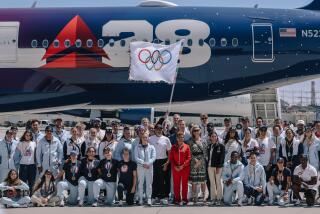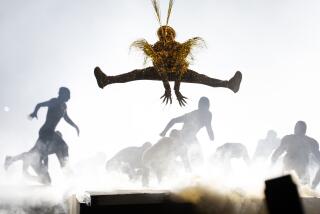Turin Wonders Whether Games’ Glow Will Last
TURIN, Italy — The famously sullen residents of Turin said farewell to the Winter Olympics on Sunday, worried about the huge amount of money spent but savoring a new liveliness in a city not known for spirit or emotion.
Turin officials pronounced themselves satisfied with their handling of the Winter Games, but braced for what is often called the Olympic Hangover.
City boosters had a lot riding on these Games: They desperately hoped the $3.4 billion they invested in the spectacle would put Turin on the map and seal its transformation from a gray postindustrial city that had fallen on hard times to a modern, vital destination.
“Stereotypes are very hard to fight, but I think we showed this time that we can fight the stereotypes and win,” said Anna Martina, a city official and liaison to the Olympics.
One challenge will be absorbing the collection of sparkling, expensively refurbished sports arenas and other buildings erected for the Games.
Some of the athlete and media lodging, for example, will be turned into university dorms and public housing. The Palavela, built for the 1961 centennial celebration of Italy’s unification and renovated for the figure skating competition, will become a venue for concerts and art shows. The Fascist-era Olympic Stadium, site of the opening and closing ceremonies, will be used by Turin’s soccer teams.
Turin Mayor Sergio Chiamparino told reporters that it would be crucial to keep the city busy and the venues in use to avoid losing momentum in the city’s revival. Among the events the city plans to attract are world competitions in chess and fencing.
City boosters say they’ve seen a new sense of civic pride and energy that they hope will help move Turin from an economy that relied almost solely on the declining Fiat automaker to one that diversifies into technology, research, innovation and art.
“I think we have changed our mentality, that sense of failure that burdened the city for a long time,” said Evelina Christillin, deputy president of the Turin Olympics organizing committee and longtime Turin resident. “A lot of seeds have been planted.”
It took a while for the people of Turin to warm up to the Games. Tickets were too expensive for many locals, and winter sports do not have a huge following in Italy. That is particularly true in Turin, where many residents immigrated from Sicily or other parts of southern Italy; skiing simply is not part of their culture.
On top of that, there is the personality of the Turinese. People here say they tend to be closed, reticent, not inclined toward bold emotional displays.
Italian attendance at the Games eventually increased. Perhaps more important, or at least more evident, was the keen interest shown in cultural events on the margins of the Games. Tens of thousands of people, Italians as well as visitors, coursed through downtown streets during nighttime celebrations, and Italians also filled the free concerts held after each night’s medals presentation.
It wasn’t Rio de Janeiro, but for Turin, in winter, this was remarkable.
“I was really surprised; it was as though there was a general desire to participate in something important, and the Games brought it out,” said Walter Barberis, a book publisher and Turin native. “Maybe this civic feeling was always there, but there wasn’t an awareness of it. Turin has been helped psychologically. The Olympic Games have been our psychoanalyst.”
Turin, in its problems, is in many ways a microcosm of other parts of Italy. It is an aging community. The young are leaving, and only immigration prevents a precipitous decline in the population. Unemployment is high, and traditional family structures are disintegrating.
The city beautified ahead of the Olympics, built a subway (long denied to Turin while the patriarch of Fiat lived) and repaired pavement and piazzas. But in some areas, the long Olympic banners in blood-orange red and bright yellow could not hide vacant lots strewn with debris.
“When you have visitors, you have to dress up, and this has been a good opportunity to change Turin’s face,” said Msgr. Giacomo Lanzetti, head of pastoral programs for the Roman Catholic Church in Turin. “The problems are well covered, but they are still there.”
Turin organizers and officials say they often had to contend with an aloof central government that was loath to contribute money, and a national television broadcaster that also seemed uninterested in the months leading up to the Games.
Prime Minister Silvio Berlusconi refused to attend the opening ceremonies, possibly because he did not want to praise a city dominated by a leftist party against which he is running.
Berlusconi did attend Sunday’s closing, to applause and boos.
The Winter Games are an elitist event, and they had little to offer most workaday Turinese. Several merchants at an open-air market on the Corso Sebastopoli, a stone’s throw from the Olympic Stadium, said the Games had cost them business because the city closed a nearby parking lot and rerouted traffic.
Serafina Petrocca, who sells inexpensive clothing at the market and has been losing money, said she was nevertheless happy to see improvements in the city infrastructure. A traffic light outside her apartment never worked; 10 days before the Games started, the light was repaired. What about 10 days after the Games are over?
“That’s what I want to know, what happens after?” she said. “That is what we are all wondering.”
More to Read
Go beyond the scoreboard
Get the latest on L.A.'s teams in the daily Sports Report newsletter.
You may occasionally receive promotional content from the Los Angeles Times.







